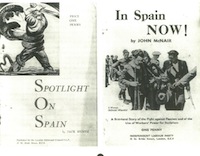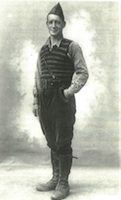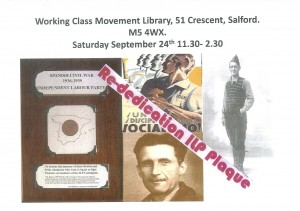Even after 80 years the role of the ILP in the Spanish Civil War is still a controversial topic. Its role was minor, says CHRISTOPHER HALL, but the contribution and sacrifice of ILP volunteers deserves to be remembered.
George Orwell’s Homage to Catalonia is still the most famous and most read book about the Spanish Civil War; equally Ken Loach’s film ‘Land and Freedom’ is its best known cinematic portrayal. Both works cover a very small and distinct part of the conflict, which virtually ignores the war as a whole and the role of the International Brigades.
 The ILP, like the Communist Party, threw its energy and resources into fighting fascism in Spain, and the ILP and its members were involved in far more than the events depicted by Orwell and Loach.
The ILP, like the Communist Party, threw its energy and resources into fighting fascism in Spain, and the ILP and its members were involved in far more than the events depicted by Orwell and Loach.
In the 1930s the ILP was a revolutionary socialist party in sharp decline. It had left the Labour Party in 1932 in an argument over ‘standing orders’ and had seen its membership fall from around 16,000 in 1932 to about 4,000 in 1936. Its four MPs, led by the charismatic James Maxton, gave the ILP a greater profile than its influence on the ground merited.
Like the Communist Party and left wing members of the Labour Party and trade unions, the ILP was involved in the Hunger Marches and was part of the resistance to Oswald Mosley’s Blackshirts at Cable Street in 1936.
When the Spanish Civil War broke out in July 1936 the ILP belonged to an International known as the London Bureau, which consisted of small left-wing Socialist and dissident communist parties. Her sister party in Spain was the POUM (Partido Obrero de Unification Marxista), an anti-Stalinist party which supported the revolution that had broken out in Catalonia in response to the military uprising.
The ILP were involved in the Spanish Civil War in three main areas: humanitarian aid, military volunteers and political lobbying. From the beginning of the war the ILP began to raise money to help her sister party in Spain, and there was even a ‘self-denial’ week in which individuals had to give up a luxury and the money saved was donated to aid Spain.
Funds were sent to John McNair, who had been sent to Barcelona to set up an ILP office and make contact with the POUM executive. McNair passed on the money to the POUM to buy medical supplies. Once more than £1,000 had been raised the ILP brought a van, which was turned into an ambulance, filled with medical supplies and driven to Spain along with two nurses and given to the POUM. One of the drivers, with World War I experience, stayed behind to command an artillery unit.
Food and shelter
In 1937 the ILP raised funds to fill a food ship to help feed people in Bilbao in the Basque country. When the Spanish Republican government refused the offer, the money was used to send further medical supplies to Spain and to finance the care of Basque refugee children – 4,000 of whom had been evacuated to the UK. The ILP housed 40 of them at The Grange in Street, Somerset, a house supplied by the Quaker Clark family (as in Clark’s shoes).
Newport ILP members worked closely with the local Communist Party, and in Aberdeen the ILP and Communist Party worked together up until June 1937 when POUM was declared illegal and relations between local members broke down.
ILP volunteers fought in a variety of military forces in Spain. These included the ILP’s own unit, the ‘ILP Contingent’, militias, the Republican army and the International Brigades.
 In autumn 1936 Bob Edwards (left), a member of the ILP executive (National Administrative Council), won agreement to raise a military force to help the POUM. In all, around 25 men left the UK for Spain in January 1937 and were joined by more British volunteers, including Orwell, bringing its strength up to around 40.
In autumn 1936 Bob Edwards (left), a member of the ILP executive (National Administrative Council), won agreement to raise a military force to help the POUM. In all, around 25 men left the UK for Spain in January 1937 and were joined by more British volunteers, including Orwell, bringing its strength up to around 40.
Military training was virtually non-existent and after two weeks of mainly marching up and down the volunteers were bussed to the front where they received antiquated rifles and very limited ammunition. They stayed there until late March 1937, but the front was a quiet one and the ILP Contingent took part in no major battles and only a single trench raid. As Orwell famously exclaimed: “…nothing happened, nothing ever happened. The English had got into the habit of saying that this wasn’t war, it was a bloody pantomime.”
In late March 1937 the ILP unit was on leave in Barcelona, where they met Walter Tapsell, British Battalion Commissar of the International Brigades, to discuss joining them. The ‘May Days’ events made this impossible: the POUM and the anarchists of the CNT-FAI took up arms when government forces attempted to re-take buildings and services controlled by the revolutionaries. The ILP volunteers were involved in guarding POUM-held buildings. One ILPer took to his hotel room with a large quantity of beer, hoping to sit out the troubles, but was arrested.
After the May Days some volunteers went home, some joined other units and around half returned to the front. In June 1937 the POUM was outlawed and most of the ILP volunteers returned home to avoid arrest, although several joined other Republican units. The last ILP volunteer to leave Spain was Reg Hiddlestone in February 1939.
Working class
Like the British Battalion, the bulk of the ILP Contingent were party members; most were of working class origin and active trade unionists. A few had had previous military experience either in peace time or in the First World War. One man even deserted from the Tank Corps to join the ILP Contingent.
The vast majority were dedicated anti-fascists and only a handful were there purely to support the revolution. Two men even applied to both the ILP Contingent and the International Brigades, joining the ILP unit simply because it replied to them first.
Two ILP members were killed in Spain – Bob Smillie, who died from untreated appendicitis in a Spanish Prison, where neglect and incompetence seemed to be the cause of death rather than any deliberate action, and Arthur Chambers, who was killed fighting with an anarchist unit in July 1937. In all 13 members of the ILP unit were wounded and two hospitalised.
At least 15, and possibly more than 100 ILP members served in the International Brigades. Two leading Merthyr ILP members served in the British Battalion: Evan Peters and Lance Rogers. Rogers joined the Communist Party while in Spain, but re-joined the ILP on his return and became a conscientious objector in the Second World War.
Three Merseyside ILPers fought in the International Brigades, and one, James Stewart, was killed at Jarama in February 1937. Walter Sproston, an ILP member in Swinton (Salford), was killed at Calaceite in March 1938.
Up to June 1937 the ILP supported the POUM politically. ILP MP John McGovern visited Spain on a propaganda tour in autumn 1936. After the POUM was declared an illegal party the ILP continued to support the Spanish Republic but also attempted to get POUM prisoners released and were involved in three delegations to Spain in 1937-38.
In addition, David Murray, in Spain investigating the death of Bob Smillie, helped Scottish International Brigaders who had been imprisoned for indiscipline and insubordination, providing clothes, food and cigarettes and passing messages to relatives.
 The role of the ILP in the Spanish Civil War was a very minor one and did little to affect the course of the war, and its support for POUM meant it was ostracised by other left wing parties. But considering its size and very limited financial resources, ILP members put a tremendous effort and huge amounts of energy into helping the POUM and fighting fascism. Their contribution and sacrifice needs to be remembered and an event at the Working Class Movement Library in Salford later this year is designed to do that.
The role of the ILP in the Spanish Civil War was a very minor one and did little to affect the course of the war, and its support for POUM meant it was ostracised by other left wing parties. But considering its size and very limited financial resources, ILP members put a tremendous effort and huge amounts of energy into helping the POUM and fighting fascism. Their contribution and sacrifice needs to be remembered and an event at the Working Class Movement Library in Salford later this year is designed to do that.
On Saturday 24 September (11:30-14:30) there will be a re-dedication of the plaque to the ILP volunteers held at the library. Several of the volunteers’ family members are expected to be present, including Orwell’s son, Richard, and Quentin Kopp, the son of Orwell’s commander in Spain. I also hope a new sculpture of Bob Smillie, made by Frank Casey, will be on display.
—
Christopher Hall is a trustee of the International Brigades Memorial Trust and author of ‘Not Just Orwell’: the Independent Labour Party volunteers and the Spanish Civil War (Warren and Pell, 2009) and In Spain with Orwell: George Orwell and the ILP Volunteers in the Spanish Civil War, 1936-1939, (Tippermuir Books, 2012).
This article first appeared in the IBMT newsletter.
The event to re-dedicate the plaque to ILP volunteers is at the Working Clas Movement Library in Salford on 24 September. It is supported by The Orwell Society and the ILP.
The plaque was originally unveiled in May 2009.
For more details of the event please e-mail Chris Hall: christoff_hall@yahoo.com


